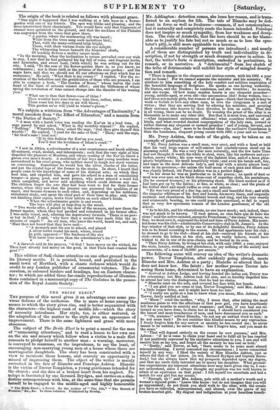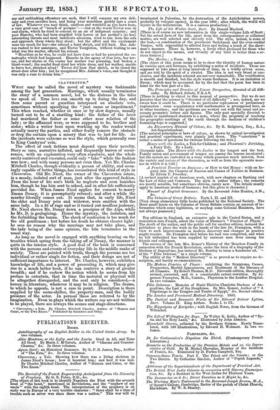TILE BRIDE ELECT. *
Tam purpose of this novel gives it an advantage over some pre- vious fictions of the authoress. She is more at home among the scenes to which the story gives rise, and is better acquainted with the characters—the highest rank of middle life—which the story of necessity introduces. Her style, too, is either matured, or the adaptation of the matter to the style gives an appearance of improvement. There is the same lightness and grace with more closeness.
The subject of The Bride Elect is to point a moral for the man of "-unmeaning attentions," and to read a lesson to her own sex on the sin and misery which follow when a victim to a male flirt consents to pledge herself to another man : a warning, moreover, is conveyed to mammas, on the imprudence, to say the least, of encouraging non-marrying young men at a house where there are marriageable daughters. The story has been constructed with a view to inculcate these lessons, and scarcely an opportunity is missed of impressing them. The object of the writer is mainly embodied in the fate of Blanche and Penelope Ashton. Blanche is the victim of Trevor Templeton, a young gentleman intended for the church ; and she dies of a broken heart from his neglect. Pe- nelope is fascinated by one Bernard Brydges, and carries on a clan- destine correspondence with him, at the same time that she permits herself to be engaged to the middle-aged and highly honourable • The Bride Elect ; a Novel. By the Author of " The Jilt," "The Breach of Promise," Ito., &a. In three volumes. Published by Newby.
Mr. Addington : detection comes, she loses her reason, and is trans- ferred to an asylum for life. The tale of Blanche may be defi- cient in force as well as freshness—common, if not commonplace ; but it naturally and completely reads the lesson intended. Penelope does not inspire so much sympathy, from her weakness and decep- tion. The rule of Aristotle, that the hero should be so far blame- able as to justify his fate but not so much so as to lose the spec- tator's pity, is still more applicable to a heroine.
A considerable number of persons are introduced; nd nearly all of them are distinguished by truth and individuality in de- scription, if not by strength or much dramatic power in action. In fact, the writer's forte is description, embodied in portraiture, in remark, or in narrative. A " detrimental " from her sketch of the tribe of detrimentals will exhibit her style of mingled descrip- tion and remark.
"There is danger in the eloquent and zealous curate, with his 1001. a year and no house ! For we cannot separate the minister and his ministry. We attribute to him something of the holy comfort and sublime inspiration of the beautiful language of Scripture. He speaks as one having authority. He blames, and she blushes ; he condemns, and she trembles; he mourns, and she weeps. Of how many maiden hearts is one eloquent preacher— young, middle-aged, or even old—the unconscious idol! Some women, too— and those not merely girls, but women of all ages—think that though it may be weak or foolish to love any other man, to love the clergyman is a sort of virtue ; that they are serving God by adoring his minister, and securing their entrance into heaven by their devotion to him on earth. That this is all wrong, there can be no doubt. To worship the priest of the altar is as blameable as to make any other idoL But that it is most true, and universal —what impassioned anonymous effusions! what countless tributes of all kinds, and what crowded excited congregations of the lady race, reward or rather distress any eloquent or earnest preacher ! and if young, fervent, and handsome—alas, else! more to be dreaded than the exclusive Guardsman is then the handsome, eloquent young curate with 1001. a year and no house."
Mr. Percy Ashton the uncle of the girls, may be taken as an example of portraiture. "Mr. Percy Ashton was a small man, very erect, and with a head so bald that his very large organs of self-esteem and combativeness stood out in alarming relief. He was a very fair man naturally, and the few hairs Time had not thought it worth his while to steal, were, lie his eyebrows and eye- lashes, snowy white ;. his eyes were of the lightest blue, and of a keen phos- phoric brightness; his teeth beautifully white ; and even his hands soft, fair, and taper as the most delicate lady's, and kept with a nicety almost femi- nine in its precision,—for unless the half-moon of each pink and filbert nail was clearly defined, old Percy Ashton was in a perfect fidget.
"In his dress he was as particular as in his person ; no speck of duet or mud was ever seen on his black dress-coat of superfine cloth, his pantaloons, (for he scorned trousers,) or his glistening shoes. His linen seemed as if it had been got up by the fairies ; se fine, ao white, so clear; and the plaits of his frilled shirt and small ruffles so even and minute.
"He was very proud of a fine leg, and a small and beautiful foot ; and with the singular whiteness of his face and hands, his snowy linen, and exquisite neatness and cleanliness, his brilliant brooch and ring, and his very courtly and aristocratic bearing, no one could pass him unnoticed, or fail to regret that so very few specimens remain of the London gentleman; of the old school.
"As to his life, and his whereabouts, no one knew much and, indeed2 there was not much to be known. 'II vaut mieux, ne mien fore qua de faire des riens !' said the active-minded, energetic Frenchman ; des miens,' however, we fear, we must own it, engrossed the mind and time of Percy Ashton. His nomi- nal home was his club—a fashionable Conservative club in St. James's. In the bay-window of that club, or by one of its delightful firesides, Percy Ashton was to be found according to the season. He had apartments near his club ; he dressed to go to his club—dined at his club—received his friends at his club—wrote his letters at his club, and, we verily believe, would have wished to die in one of its arm-chairs, and be buried in its area.
"Thus Percy Ashton, by living at his club, with only 1000/. a year, enjoyed the state, luxury, cooking, and attendance, to say nothing of the society and amusements, of a man of 10,000/. per annum."
The following scene will convey an idea of the writer's dramatic power. Trevor Templeton, after suddenly going abroad, meets Blanche and Mrs. Ashton at a party ; Blanche so altered that he does not know her. She faints ; her mother presses Trevor into seeing them home, determined to have an explanation.
"Arrived at Ashton Lodge, and having handed the ladies out, Trevor was for retreating; but Mrs. Ashton took his arm, and so forcibly impelled him to attend her into the diningroom, that he had no choice.
"Blanche sank on the sofa, and covered her face with her hands.
" ' I am glad you are come at last, Trevor Templeton,' said Mrs. Ashton : a little longer delay, and it might have been too late.' " really am quite at a loss to know what you mean, Mrs. Ashton,' said Trevor, fairly nettled at last. "'Mean!' cried the mother, why, I mean that, after taking the most assiduous pains to win the affections of that poor girl you have heartlessly left her for months in anxiety and suspense ; and thlit, if you had not re- turned as you have done to claim her at last, I should have considered you the basest and most treacherous of men, and have denounced you as such.' "'Oh, mamma!' sobbed Blanche, do not say an unkind word to him : is he not come back? Do not embitter this blissful season by any reproaches. I freely forgive him for any sorrow or anxiety he has caused me; he never meant to be unkind; he never thinks : but I forgive him, and you must do the same.'
"'That will depend entirely on the course he now pursues,' said Mrs. Ashton : if he is come to claim your hand and to fulfil all he has implied if not positively expressed by his exclusive attentions to you, I can and will receive him as my son, and forget all the anxiety he has cost us both.' "'Really,' said Trevor, at last, there seems to be some most absurd misunderstanding. I never concealed my circumstances ; I never committed myself in any way. I liked the society of Miss Blanche Ashton, ust as others did that of her sisters, (to wit, Bernard Brydges and Captain Beres- ford,) but she always knew that my prospects depended upon my degree, and that my uncle fully intended me to marry his daughter. What ground- less expectations my innocent attentions here may have given rise to, I can- not understand, since I always thought my position was too well known to admit of an equivoque on thatpoint : I felt myself too uncertain and bad a match for any girl but my cousin: " 'F,nongh, !' said Mrs. Ashton, pale with all a mother's wrath and a woman's injured pride : Leave this house: but do not imagine that you will go unpunished; do not think you shall walk to the altar, with the cousin you have so ridiculed, misrepresented, and abused, over the grave of my. broken-hearted girt. My disgust and indignation at your heartless treach- cry and unblushing effrontery are such, that I will conquer my own deli- cacy and even sacrifice hers, and bring your matchless perfidy into a court of law. Whatever you may think, cautious and watchful as you have been, a very good case of breach of promise '—but at the words Trevor rose in real alarm, which he tried to conceal by an air of indignant surprise ; and poor Blanche, who had been stupified with horror at her mother's (to her) astounding threats and most indelicate allusions, tried to rise from the sofa and approach them where they stood ; but the effort and the excitement were too much for her—she uttered a faint shriek, and fell back. Mrs. Ash- ton rushed to her assistance, and Trevor Templeton, without waiting to see what was the matter, effected his retreat. "Heartless as he was, he could not have done so had he perceived the ca- tastrophe which had happened. Blanche in the agony of true love, her ter- ror, and her shame at the course her mother was pursuing, had broken a blood-vessel; the scarlet flood dyed her white dress, and her mother, unable to leave her, shrieked aloud! Trevor did hear that shriek, as he closed the street-door after him; but he recognized Mrs. Ashton's voice, and thought it was only a ruse to detain him."



































 Previous page
Previous page